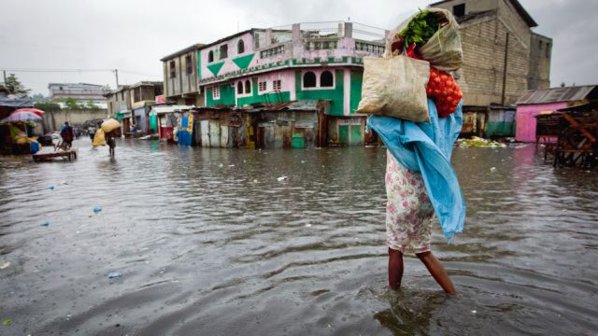
Lima, Peru Dec 2, 2014 – Haiti, the Dominican Republic, St Vincent and Honduras are among countries listed as most threatened by extreme weather events in a report presented by the development and environmental organisation Germanwatch, at the UN Climate Summit (COP20) in Lima, Peru.
While the Philippines, Cambodia and India were most affected by extreme weather events in 2013, Sönke Kreft, author of the study and Team Leader for International Climate Policy at Germanwatch, noted that this year’s Global Climate Risk Index, highlights the vulnerability of the Caribbean/Latin American region.
“The Index especially highlights the climate vulnerability of the region hosting the COP; four out of the ten most impaired countries come from Latin America and the Caribbean,” said Kreft. “We hope that the results of the Index further increase the awareness for climate protection and adaptation in this region. The Climate Summit in Lima can spur action in these countries and facilitate international support.”
In response to a question posed by Abeng News Magazine, he outlined some measures the countries need to take to mitigate the risks while pressuring industrialized states to take action.
“We all remember the images of the catastrophic Typhoon Haiyan, which wiped out entire regions and took the lives of more than 6000,” said Kreft, of the catastrophic events in Asia in 2013. “It was the most severe tropical storm ever to make landfall. Last year, at the beginning of the Climate Summit in Warsaw, many people were struggling there for their lives. Climate change must be controlled so that the future will not bring more of these record-breaking catastrophes.”
India was also severely impacted in 2013, suffering from the second largest cyclone ever to hit the country.
Germanwatch said the Global Climate Risk Index’s long-term component, which depicts 1994–2013, shows that the major impacts of floods, storms and heat waves often fall on developing countries. Nine out of ten countries are considered ‘low’ or ‘lower-middle’ income countries, with the ‘Bottom three’ being Honduras, Myanmar and Haiti.
The environmental organisatioon said that from 1994 to 2013, there were more than 530.000 deaths caused by more than 15.000 extreme weather events, as well as nearly 2.2 trillion US-Dollars (in Purchasing Power Parities, PPP) in damage.
“The 2015 edition of the Index comes at a crucial point for the international community,” said a Germanwatch statement.
“The Lima COP marks the start for several decision points that could help better manage the impacts of extreme events and climate change. In March, countries will adopt the Post-2015 framework for disaster risk reduction, which asks countries to adjust policies in order to prevent natural catastrophes.
“The decision of the Sustainable Development Goals in September will lay out the new development normative for the next decade and beyond; and in Paris next December, a new climate agreement is expected to curb emissions and support people and countries affected by climate change.”
The organisation anticipates that in Lima, important decisions are expected, especially in regard to helping countries tackle climate related loss and damage.
“The results of our Index are a stark reminder to the international community that we have to step up ambition and action in order to prevent the unmanageable and manage the unavoidable,” said Kreft.
The December 1-12 COP20 is to discuss and shape a binding international agreement aiming to reduce global carbon emissions.
The week before the summit, prompted by the Socialist and Democrats (S&D) bloc, the European Parliament adopted a resolution calling on the EU negotiators attending the summit to do their utmost to ensure that significant progress is made towards achieving a new global climate agreement next year and avoid a 2° rise in global temperature.
In the text, the Members of the European Parliament (MEPs) called for urgent and effective measures to curb global warming because “climate change represents an urgent and potentially irreversible threat to human societies, biodiversity and the planet, and therefore, must be addressed at international level.”
“The challenge for Lima is clear: all states need to agree on the basis for an international binding climate treaty. Until now the United States and China have been blocking the way, but it seems that now, they take climate change more seriously. As the biggest world polluters, their contribution will be crucial,” S&D negotiator, MEP Jo Leinen.












